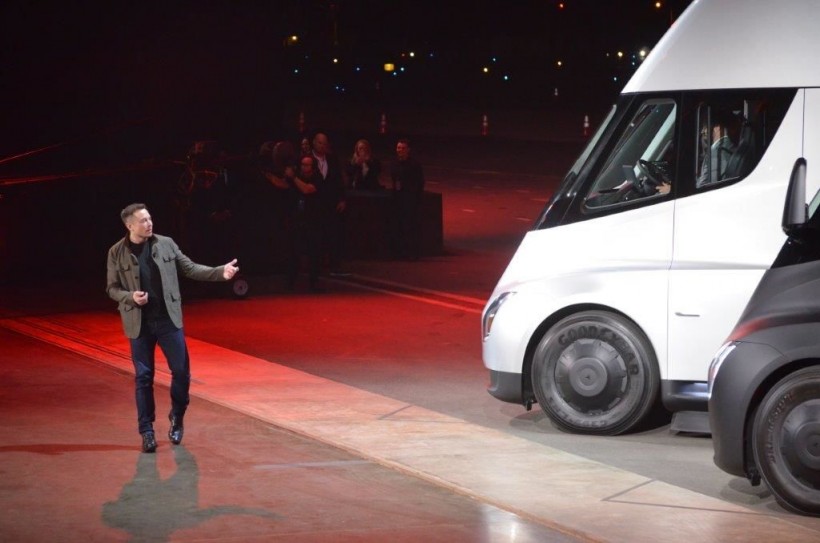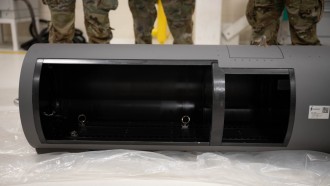Elon Musk announced that Tesla would begin producing electric semi-trucks more than three years ago, but on Thursday, the automaker finally delivered its first electric semis to PepsiCo, according to a report by AP.
The Texas-based business officially delivered the trucks to Pepsi's factory in Reno, Nevada. Live coverage of the event was also provided on Musk's newly-owned platform Twitter.

(Photo : VERONIQUE DUPONT/AFP via Getty Images)
Tesla Chairman and CEO Elon Musk unveils the new "Semi" electric Truck to buyers and journalists on November 16, 2017 in Hawthorne, California, near Los Angeles.
Three Electric Semis
The Tesla CEO jumpstarted the highly-anticipated event as he was seen driving one of the three electric semis while a crowd watches him inside the factory.
One of the semis was printed with Pepsi's iconic logo, another was painted white, and the last one bore the colors of Frito-Lay.
In Modesto, California, a Frito-Lay facility is hosting a zero-emissions freight experiment in which PepsiCo is participating. A $15.4 million clean-freight technology funding from the California Air Resources Board is supporting that project, which will use 15 Tesla battery-electric tractors as well as other electric trucks, as per AP.
Furthermore, an additional federal tax credit of up to $40,000 would be available for electric semis.
Musk announced that production would start in 2019 and that the Tesla Semi trucks would be able to follow one another autonomously in a convoy during an event in November 2017 where they were first unveiled.
But he claimed that Tesla's "Full Self Driving" system is not yet prepared to be autonomous during the company's third-quarter results conference call in October.
According to Musk, the vehicle can travel 500 miles (800 kilometers) on a single charge when towing an object weighing 82,000 pounds (37,000 kilograms). By 2024, the business wants to produce 50,000 Semi vehicles in North America.
Rivals of the automaker building hydrogen-powered semis claim that battery-powered trucks will not work for long-haul carriers because the massive batteries would take a long time to recharge. However, Musk claimed that heavy trucks do not require hydrogen.
Read Also: Tesla China Recall: Over 435K Units Believed to Have Rear Light Issue, What's Next?
Completing a 500-Mile Test Run
Musk recently celebrated success with Tesla in the past month, particularly with the display of its enormous electric vehicle, the Tesla Semi, for finishing a 500-mile test run.
It demonstrated how well the EV can handle a long-distance trip, one that would enable businesses and drivers to go nonstop to remote sites without charging.
The Tesla Semi recently had a test that focused on its extremes, with the company driving the truck for 500 miles with an 81,000-pound transporter loaded to its maximum capacity.
The electric vehicle accomplished this and demonstrated that it is capable of hauling a heavy load while maintaining the cargo hauler's promised range.
The Tesla Semi had significant delays, much like the company's other EV projects, even though it was originally scheduled to be released between 2020 and 2021.
But finally, the company has started rolling out these highly-anticipated EVs, and Pepsi is the first to experience its glories.
Related Article: Tesla Chargers Are Now Available at Best Buy; Here's What This Means for EV Owners










